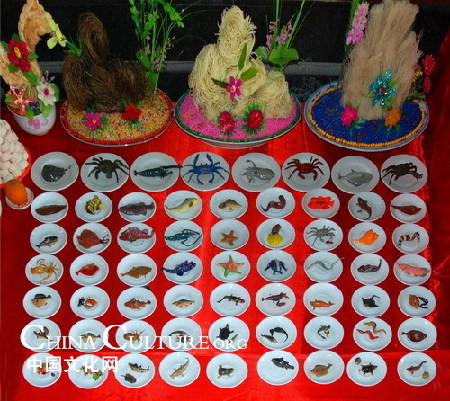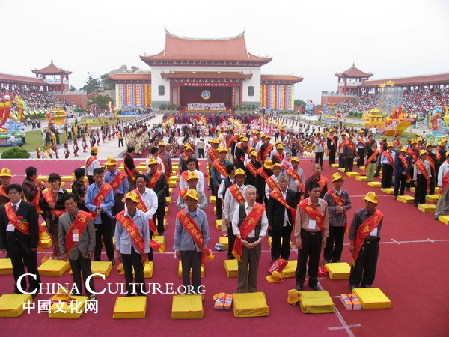The belief in Mazu
Folk Customs
Mazu’s birthday falls on the 23rd day of the third month of the Chinese Lunar Calendar and the anniversary of her death is the 9th day of the ninth lunar month. People hold a series of activities annually on those two days to commemorate the legend.
Folk customs relating to Mazu include sacrificial rituals in Mazu temples, drama performances, memorial ceremonies for ancestors and thanksgiving rituals for Heaven.
Flour, mushrooms, edible tree fungi and other edible materials are used to make marine animal-shaped sacrificial offerings. People burn incense, set off firecrackers and play traditional Chinese musical instruments during the sacrificial ceremony.
During festival evenings, fishermen, farmers and citizens hold lanterns to walk around the places they have lived and pray for peace.
To show their respect to Mazu, the women in Meizhou usually comb their hair into boat-shaped styles and wear blue coats and red-and-black trousers. When they encounter puzzling scenarios, they pray to Mazu for a solution.
Mothers usually pray for perfume satchels for their children in Mazu temple, hoping that Mazu will bless their children with good health and a promising future.\
Fishermen do not fish during Mazu’s birthday, embodying the harmony between humanity and nature.
Mazu belief was introduced into Japan in the reign of Emperor Zhu Yuanzhang (1368-1398) of the Ming Dynasty (1368-1644). With many Chinese nationals living abroad, Mazu belief has also spread to Malaysia, Singapore, Thailand, Indonesia, Vietnam and the Philippines, as well as America, Australia and Europe.
Today, achievements in research on the Mazu culture have become valuable materials for the study of the history of navigation, science, overseas Chinese, the development of off-shore islands and economic and cultural exchanges with foreign countries. It has also benefited the history of folklore and ancient Chinese religion.

























